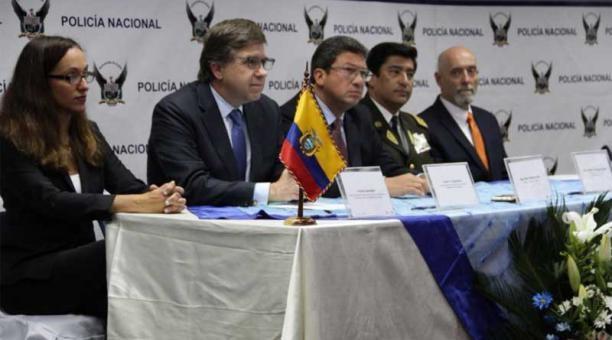Ecuador-US Security Deal: Is President Lenín Moreno Opening Door for US military presence?

US and Ecuadorian officials announced the bilateral security cooperation Wednesday in Quito. Photo Credit: Ecuador Ministry of the Interior
Signaling towards a possible shift in the regional policy of Ecuador, the South American country signed an security agreement with the United States. The US ambassador Todd Chapman and the Interior Minister César Navas announced in a press conference yesterday that Ecuador and the United States will be jointly forming a front to “fight against transnational organized crime”. Navas resigned today April 27, reportedly having taken responsibility for his Ministry’s inability to arrest Alias Guacho who is accused of having murdered three journalists in the Colombia-Ecuador border.
The recent move has been criticised by many leaders and activists, who claim that the announcement sets back anti-imperialist victories achieved under President Rafael Correa’s government. It is also alleged that the agreement is an attempt towards further militarization, and re-establishment of US military presence in the country.
The security deal announcement comes after a turbulent couple of months in Ecuador’s northern border region, that saw the kidnapping and murder of at least six Ecuadorian citizens, including three journalists who were covering the rise in violence in the border area.
Concretely the agreement allows for the two security institutions of the US, the Drug Enforcement Authority (DEA) and the U.S. Immigration and Customs Enforcement (ICE) to work in Ecuador. The objective of the agreement states that the authorities of both countries can exchange information and help to create new strategies to control the narco-criminal mafias and crimes like money laundering, trafficking of people, weapons, contraband etc. They also agreed on the establishment of the Investigative Unit on Transnational Crime within the Ecuadorian police.
Also present at the press conference was the acting commanding general of the Ecuadorian Police, Nelson Villegas, as well as the regional sub-director of the DEA for Ecuador and Venezuela, Gene Hawk, and the attaché of the Department of National Security, Yvette Searight.
The deal comes in the background of a possible Ecuador-United States security cooperation already brewing, after the meeting of the Lieutenant General of the Southern Commander of the United States Army, Joseph P. DiSalvo with members of the Ecuadorian armed forces. Their meeting had the stated intention of ‘strengthening’ the relationship with the Government of Lenín Moreno and to push for bilateral cooperation.
Many see yesterday’s agreement as opening the door to US military presence in Ecuador, part of US strategy to regain control in the region and increase pressure against Venezuela from all possible angles.
This is particularly concerning because it was under former President Rafael Correa, for whom Lenín Moreno was vice president, that Ecuador ended the bilateral cooperation agreement with the United States signed in 1999 about the use of the Manta base for the war against narco-trafficking in the region. The 1999 agreement allowed for the ‘access and use by the United States of America of the installations of the Ecuadorian Air Force base in Manta for anti-narcotic activities,”.
In 2009, the Ecuadorian government announced that they were concluding the agreement and thus the activities carried out in the Manta base would end and all foreign personnel should leave the base. This action was historic, it challenged the power and control of the US in the region and was a vibrant example of Correa and his government’s efforts towards pro-Latin American unity and against imperialism and militarization.
The recent violence in the northern border area of Ecuador has already drastically increased the militarization of the area, once the death of the three journalists was confirmed, Ecuador announced a joint military operation with Colombia and deployed 10,000 soldiers. A week after the death of the journalists Lenín Moreno announced that Ecuador would suspend its status as guarantor state in the ELN-Colombian Government peace process.
Get the latest reports & analysis with people's perspective on Protests, movements & deep analytical videos, discussions of the current affairs in your Telegram app. Subscribe to NewsClick's Telegram channel & get Real-Time updates on stories, as they get published on our website.























